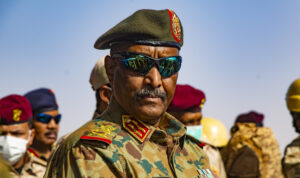Reports of violence breaking out in Africa rarely raise eyebrows in the West these days. Perhaps we feel it has little to do with us, whatever the West’s historical responsibilities for the continent’s problems. But as the recent events in Sudan demonstrate, this is no longer the case. The turmoil unfolding there is of far more importance to us than we might think.
While the fighting in Sudan is, on the face of it, little more than a power struggle between the two rival factions that control the country, there is also an important international and geopolitical dimension to the conflict. At its heart is the great powers’ competition for influence over the continent — what has been called the “new scramble for Africa”.
Given its vast natural resources, including gold, its agricultural wealth and its geopolitically strategic location, Sudan has long attracted regional and international power plays. In recent years, Saudi Arabia, the United Arab Emirates, Egypt and Israel have all been cultivating economic and political ties with the country’s leadership — and its two warlords in particular.
One country, however, stands out for its “special relationship” with Sudan: Russia. Putin made sure to cultivate an alliance with the country’s former leader, Omar al-Bashir, deploying the infamous Wagner Group in 2017 to provide him with political and military support. More importantly, that same year, al-Bashir signed a military cooperation agreement with Russia which included allowing the Russians to establish a military base along the Red Sea, ensuring a permanent presence for the Russian Navy in a crucial region and easy access to the Indian Ocean.
Al-Bashir was overthrown in 2019, before the agreement came into play, but Russia maintained good relations with the new administration’s military leaders, especially Mohamed Hamdan Dagalo, better known as Hemedti, whose Rapid Support Forces control the country’s gold mines. The transitional military-civilian government confirmed the decision to allow Russia to establish a base in 2020, but backtracked the following year under pressure from the US. However, once the civilian members of government were purged in yet another coup, in 2021, the agreement was revived.
Today, there is no indication that the issue of the naval base played a role in the recent outbreak of fighting, nor are any of the major foreign players openly backing either of the two warring factions. But if one side should explicitly align itself with, say, Russia, the conflict could easily turn into another front of the proxy war between the West and Russia, alongside Ukraine, with potentially disastrous consequences for the entire continent.
For Africa is already the stage of the New Great Game of the 21st century — the struggle between Western countries, China and Russia for influence over this immensely resource-rich, young continent predicted to be the next frontier of growth. In this game, Russia is particularly well-positioned. More so than the West, it enjoys strong historical and ideological ties with many African nations. The Soviet Union was the primary ally of several nations on the continent during the Cold War, and supported various anti-colonial and post-colonial movements; many countries are still ruled by parties that were supported by Moscow during their struggles for liberation from colonial or white supremacist rule, including Nelson Mandela’s African National Congress (ANC).
The West’s appeals for democracy and national independence, on the other hand, are perceived as hypocritical, given its history on the continent. Hence Russia’s argument that the war in Ukraine is actually part of a broader struggle against Western imperialism resonates in Africa, which harbours strong grievances against the West over its colonial and neocolonial practices. Indeed, a recent study carried out by the University of Cambridge’s Bennett Institute for Public Policy shows Russia remains popular across much of Africa today.
This has meant that not a single African nation has joined Western sanctions against Russia, choosing to either remain neutral — for example by abstaining in UN resolutions condemning Russia — or more or less explicitly siding with Russia, as in the case of South Africa, which in February even participated in a joint military exercise with Russia and China. It is also why Russia has actually strengthened its military, security and economies ties in the region since the outbreak of the war in Ukraine. Just last month, delegations from 40 African countries and 14 leaders assembled in Moscow for the international parliamentary conference “Russia-Africa in a Multipolar World”.
On that occasion, Putin gave a keynote speech in which he stressed that Russia “has always and will always consider cooperation with African states a priority”. He recalled the large Russian investment projects being implemented in Africa, emphasising the importance of electricity production on the continent. Russia also has a military presence in several African countries, either in an official guise or via the Wagner Group, including in Libya, Nigeria, Zimbabwe, Angola, Madagascar, Mozambique and Mali. It is also the region’s largest arms exporter (close to 50%).
Meanwhile, Sino-African relations are also deepening, with China now the continent’s largest trading partner and main source of project finance in the context of the Belt and Road Initiative. This has included massive infrastructural projects, including the Addis Ababa-Djibouti and Mombasa-Nairobi railways and the planned Angola-Tanzania railway, which will be the first railway section connecting the Atlantic coastline to the Indian Ocean, on top of roads, dams, ports and airports. China is also the largest political and economic supporter of the African Continental Free Trade Agreement (AfCFTA), which has 43 parties and another 11 signatories, making it the largest free-trade area in population and geographic size, spanning 1.3 billion people.
Even though there is no evidence that China is engaged in so-called debt trap diplomacy, as claimed by Western representatives, Chinese activities in Africa have been associated with poor labour conditions and unsustainable environmental practices. Yet it’s a fact that “African officials overwhelmingly view China’s role in Africa positively”, as the Rand Corporation noted in 2014, as do the majority of African citizens. This is not only because they see China’s tangible contribution to their nations’ infrastructure and overall economic activity, but also because China’s approach to global affairs and development — ostensibly based on non-interference in the internal affairs of other nations and on prioritising societal stability and economic development over political reforms — offers an alternative to the mainstream Western model for development, largely considered to have failed.
Indeed, it is telling that China has achieved all this without resorting to explicit military force: at present, China operates a single military base on the African continent, in the small East African country of Djibouti, which it inaugurated in 2017. The contrast with America’s approach to the continent couldn’t be starker. As part of its post-9/11 “War on Terror”, the US massively expanded its military presence in Africa, placing troops in at least 15 countries. In 2008, in order to coordinate its growing presence in Africa, the US placed responsibility for the continent under a single United States Africa Command, or Africom. This led to a considerable spike in the number of US troops, bases and drone strikes across the continent, most with counter-terrorism as the stated mission, as well as in coups (attempted and in some cases succeeded) carried out by US-trained troops.
The best-known example of Africom’s impact is the US-led bombing campaign against Libya in 2011, which plunged the country into anarchy and violence. But several other African countries have been the target of US bombs in recent years. Just last year, the US bombed Somalia and Niger. Meanwhile, as Politico recently reported, American special operations teams are playing a direct role in military actions in at least eight African countries, including Somalia, Kenya, Tunisia and Niger, under a set of classified “surrogate programmes”. Officially, the US only has one permanent base in Africa — Camp Lemonnier in Djibouti. But formerly classified documents obtained by The Intercept show that the US military footprint in Africa is much larger, encompassing 29 bases located in 15 different countries or territories. According to CBS News, “the US does have some military presence in virtually every African nation, even if it’s small”.
It seems to finally be dawning on US policymakers that this military-centric approach — which has sparked resistance in many African states — might not be the best way to counter Chinese influence on the continent. In recent months, several high-profile US representatives, including Kamala Harris, Anthony Blinken and Jill Biden, have travelled to Africa on what has been described as a “charm offensive”, while President Biden has promised to visit this year. “The United States is all in on Africa and all in with Africa,” he said last December at the second-ever US-Africa leaders’ summit in Washington.
It signalled that America seems to be catching on to the fact that African nations no longer want to be bossed around, they want to courted. They know that today they don’t have to choose sides, as they did during the Cold War, but they can do business with anyone and everyone at the same time. And this gives them power — more power than they’ve ever had. As a result, the real winner in the new scramble for Africa is likely to be Africa itself.
Disclaimer
Some of the posts we share are controversial and we do not necessarily agree with them in the whole extend. Sometimes we agree with the content or part of it but we do not agree with the narration or language. Nevertheless we find them somehow interesting, valuable and/or informative or we share them, because we strongly believe in freedom of speech, free press and journalism. We strongly encourage you to have a critical approach to all the content, do your own research and analysis to build your own opinion.
We would be glad to have your feedback.
Source: UnHerd Read the original article here: https://unherd.com/



